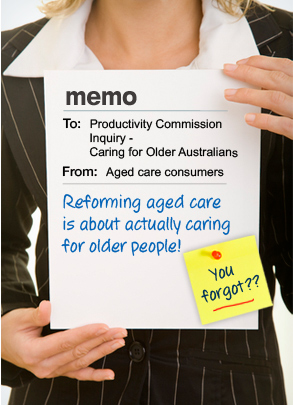The Productivity Commission believes that exposing aged care to further competition and freeing up the market even more - by removing regulatory restrictions on the number of bed licences - will solve many of the problems besetting the sector.
This is the basis of the Draft Report, 'Caring for Older Australians', which was released for public comment last week...
As part of the new consumer–directed arrangements, the Commission is proposing the progressive relaxation and eventual removal of supply-side limits on bed licences, community care packages and other services, while maintaining quality accreditation.
The theory is that by allowing more beds and more homes, frail, aged Australians will have much more choice. The good places will thrive and the not-so-good ones wither.
'Competition is a powerful incentive for providers to improve quality and efficiency, and to offer care solutions that address individuals' needs.'
The notion of 'choice' underpins this Report.
Mark Butler, the Minister for Mental Health and Ageing is on about 'choice' too. Here is his public comment on the Report:
'A lot of older Australians want to be able to consider choices about having a glass of wine at night, or a different range of bed arrangements, ensuites ..'
'"They don't want a cookie-cutter approach to aged care, where they can only have a certain-sized room and a certain range of meals.'
Sadly, the Productivity Commission and Minister Butler don't get it. Aged care isn't predominantly about 'choice'. It should be about 'quality'.
There is no point at all in having a glass of wine with dinner if there is not enough staff around to help you eat your meal or you haven't been able to get someone to assist with toileting throughout the day.
There is a moral imperative to aged care and this is lacking in the Productivity Commission Report. Focussing on choice just doesn't do it.
Firstly, it is difficult to see how very frail people and their families can ever have the sort of choice generally expected to be available to consumers in a Western society.
Decisions are often made at a time of crisis and have to be acted upon with great urgency. Location and proximity to family members are critical factors. Furthermore, in some instances, the decision as to which aged-care home is selected is made by a third party – perhaps the hospital social worker. It is nonsense to think that frail people are your average 'consumers'!
Currently, the biggest issues in aged care relate to staffing. Providers don't employ enough people to do the job. Staff are stressed and morale is often low. Residents don't get the care they need in a timely manner. It is hard to see how opening the market even further is going to address this issue. Providers, particularly those looking to make a profit, will always seek to employ the fewest number of people.
The Productivity Commission has refused to bite the bullet on the critical area of staffing and recommend that there be mandated, minimum staff/resident ratios in our aged-care homes. By not doing this, it has failed one of our most vulnerable groups – frail people at the end of life.
Of course, the Report was always going to be about how best to fund aged care. There is much within its copious pages about how this might be done. Those who can afford it should pay more. Not too much wrong with that. The notion of a single gateway to aged care (the proposed Seniors Gateway Agency – draft recommendation 8.1) has much merit. So too does the proposed Australian Aged Care Regulations Commission – draft recommendation 12.1 – which should keep the monitoring of aged-care standards an arm's length from the Department of Health and Ageing.
There are many more sensible proposals in this Report – all requiring much thought and consideration. Comment is due mid March.
How sad it is then, that the underlying premise of the whole Report is so flawed. Frail, aged people are not commodities.
Further exposure to the market economy won't provide better care. And more 'choice' is not going to solve staff shortages.



